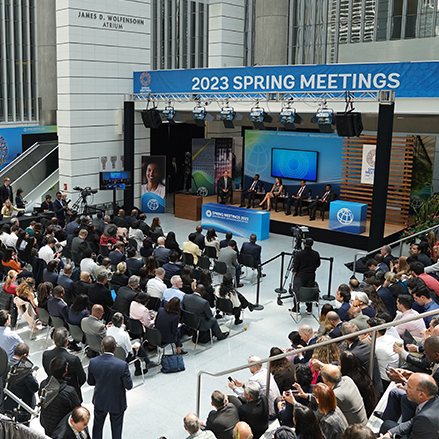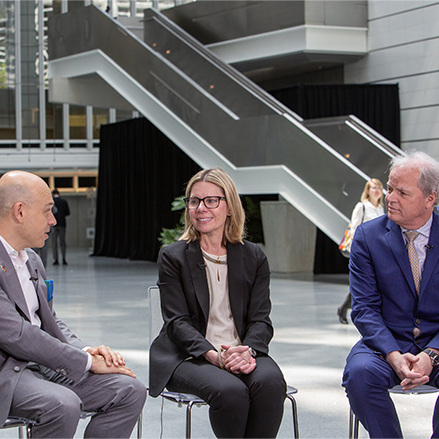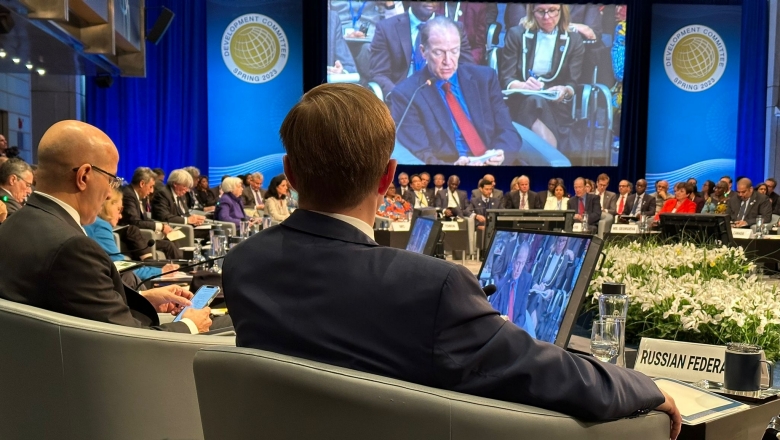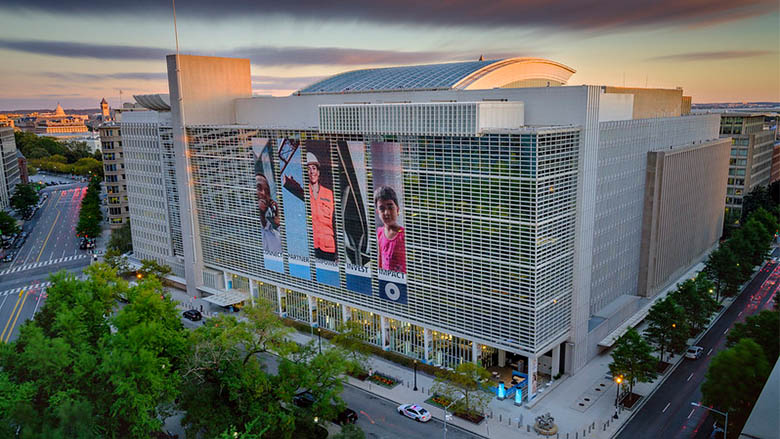The 2023 World Bank Group-IMF Spring Meetings took place from April 10-16, amidst a backdrop of challenges: from stress in the banking sector, persistent inflation, rising debt, climate change and of course Russia’s ongoing invasion of Ukraine. Addressing this instability, and looking to a future free from poverty, was at the heart of the discussions which involved dozens of contributors from across the globe.
In this latest episode of The Development Podcast, we draw on some of the highlights from that week, hearing from various speakers who attended our events and how they look to tackle some of the world’s most pressing challenges. Listen on to hear from: World Bank Group President David Malpass, IMF Managing Director Kristalina Georgieva, Senior World Bank Managing Director Axel van Trotsenburg, United Nations Deputy Secretary-General Amina J. Mohammed, Senegal's Minister of Economy, Planning and Cooperation, H.E. Oulimata Sarr, Save the Children UK CEO Gwen Hines, and Founder of the grassroots organization, We Love Reading, Rana Dajani. Listen now!
Tell us what you think of our podcast here >>>. We would love to hear from you!
Featured Voices
- David Malpass, World Bank Group President
- Kristalina Georgieva, IMF Managing Director
- Axel van Trotsenburg, Senior World Bank Managing Director
- Amina J. Mohammed, United Nations Deputy Secretary-General
- H.E. Oulimata Sarr, Senegal's Minister of Economy, Planning and Cooperation
- Gwen Hines, Save the Children UK CEO
- Rana Dajani, Founder of the grassroots organization, We Love Reading
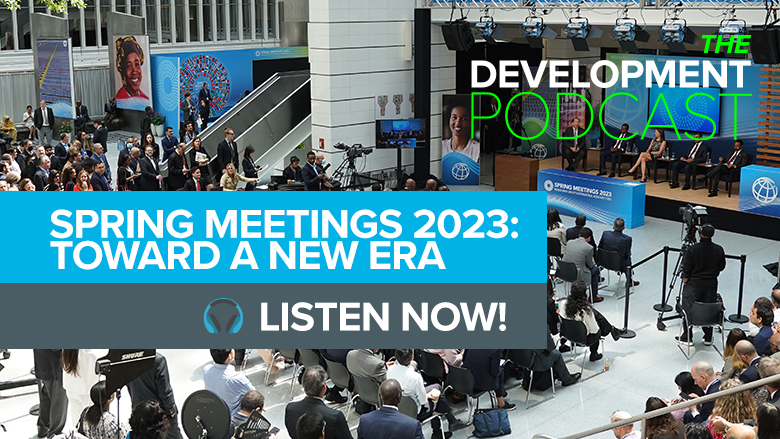
Transcript
[00:00] Srimathi Sridhar: Hello and welcome to The Development Podcast from the World Bank Group. Coming to you from Washington DC and beyond, I'm Srimathi Sridhar.
In this special edition of the podcast, we'll be giving you a snapshot of some of the key moments from this year's World Bank Group-IMF Spring Meetings. The meetings took place amidst a backdrop of challenges - from stress in the banking sector, persistent inflation, rising debt, climate change, and of course, Russia's ongoing invasion of Ukraine. Addressing this instability and looking to a future free from poverty was at the heart of the discussions, which involved dozens of contributors from across the globe.
David Malpass: How do we get better outcomes for people around the world, and especially for people that are on the lower end of the income scale?
Srimathi Sridhar: We'll be hearing from various speakers from the week and explore how they're tackling threats to development.
Amina J. Mohammed: We are off track. We were off track before COVID. It exacerbated it. And then we had, of course, the war in Ukraine and that's done even worse. However, what we are doing at the UN is to mobilize at the global level on the issues. That's a partnership discussion.
Srimathi Sridhar: All that and more coming up here in The Development Podcast from the World Bank Group.
[01:38] World Bank Group President David Malpass and IMF Managing Director Kristalina Georgieva began the Spring Meetings with a wide-ranging discussion on the complex challenges facing the global economy and a vision for the future. Let's hear from them now, starting off with President Malpass.
David Malpass: We want to talk about the world economy, about the debt problems facing developing countries, but the overall theme is how do we get better outcomes for people around the world, and especially for people that are on the lower end of the income scale, people in developing countries and people in middle-income countries and advanced economies that are suffering from lower incomes and from the cost of climate change, for instance. And I wonder, Kristalina, IMF does a lot of look at the global economic outlook. We are worried about the slowness of growth now and the prospect that it might stay slow. What do you think? And what are the big challenges?
Kristalina Georgieva: You're right. We are yet again assembling our membership at the time of high uncertainty. The recovery we so much are hoping for, a robust recovery is still a bit elusive. Why? Because we do have a significant inflation problem. That means central banks have to continue to keep interest rates higher to combat it, and that is on the way of restoring the prospects for robust growth. We have seen that this rapid transition from low interest rates, abundant liquidity, to higher interest rates and much less available liquidity has exposed vulnerabilities in the financial sector. That made the task of policymakers even harder.
So in that context, what we are projecting for this year is despite the remarkable resilience of consumer spending in the United States, in Europe, despite the uplift from China's reopening, global growth would remain below 3% as we projected it earlier this year. And what is more concerning, it would remain around 3% for the next five years. That does not give us high hope for meeting the aspirations of people, especially poor people around the world, and most importantly, poor people in poor countries.
This picture of growth is divergent. There are emerging markets that are doing better, but for frontier markets for the poor countries, the future is not so bright, dangerous divergence. We have been wrestling with one crisis after another, one shock after another. And that has pushed on the back burner the longer-term agenda of structural reforms that are paramount to uplift productivity. And with productivity remaining low, the prospects for growth are low.
The ropes that tie us together have become weaker over the last years. Fragmentation is deepening and what it means is that what has generated tremendous impetus for growth and prosperity over the last three decades - an integrated economy - is being negatively impacted. We have done research at the IMF that shows that just the cost of trade fragmentation can run as high as 7% of global GDP over the years.
So these meetings are an opportunity for us not only to talk about the immediate priorities of restoring price stability and safeguarding financial stability, but also about the longer-term prospects of growth and how prosperity can be an achievable objective for the lower-income countries. Which takes me to you. How do you see that?
David Malpass: Exactly right. It's important that there be more investment, investment in small businesses, in new businesses, and that means a flow of capital. And a worry that we have for developing countries is the capital flow right now is out of developing countries. So for many of the developing countries, it looks like they're in a phase of decapitalization rather than recapitalization.
That goes with your point that instead of having convergence, meaning people with lower incomes growing faster than people with higher incomes, so convergence toward a higher level, that's not happening right now. It's actually a divergence, and that's gravely concerning. That means inequality, that means fragility for countries. And we see more countries falling into fragility.
One of the concerns with high prices now, high prices are being applied to food and fertilizer. And a concern for the poorest around the world is the farmers are not able to plant. And if they don't get fertilizer, often they won't plant for the crop cycle because they know that their yields will be too low. And so an urgent need. And we've worked on this over the last six months, but it's still has room to come together, is that the fertilizer resources go to the people that can pay the most. And that means those farmers are providing the global crop supplies.
I wanted to pick up on your point about the trade fragmentation. Trade is vital to productivity within the world. People swapping goods in their village, within their country, and across borders is a way to add value, to create more productivity. And to the extent that that breaks down into regional blocks or protectionist blocks, that's a concern. And right now, that's the direction of travel for the world too. As it looks to stop globalization and to reverse it, the risk is that it will come out with unproductive structures and that also will weigh on world growth.
And I guess I'll finish on your opening point that just the move from very low interest rates, I think artificially low interest rates, and the capital allocation that went with it, meaning investors all over the world were making decisions based on the idea that it was 0% interest rates for a long period of time, low for long, and that misallocated the capital. So to bring that back to productive uses is really hard. If you say: "Well, we're going to keep the interest rates at current levels or go to more normal levels of interest rates," that means losses for banks that had a duration mismatch as we saw with Silicon Valley Bank.
And so there's losses being allocated by the world system now, but we should keep in mind if you just lower the interest rates back down, it won't solve the problem. What that means is that people will suffer from inflation. The dollar weakens, inflation rate goes back up, and that hurts the poor the most. So I think there has to be a goal of finding a low-inflation environment and dollar stability for the future.
[10:09] Srimathi Sridhar: Responding to these challenges and acting swiftly and collaboratively was a key theme for Axel van Trotsenburg, the World Bank's Senior Managing Director, in a session called Accelerating Development in an Age of Global Crisis.
Axel van Trotsenburg: So we have learned a lot over the last three years, and first and foremost, you have to deal with the crisis, but as a development organization, you should never take your eye off the long-term challenges. So you need to meet a double task - crisis management, but also long-term development.
And during times of crisis, what you need as operationally, you need to react fast and with volumes. And that is what we actually did. We scaled up our operations over the last three years to about $210 billion, up from $130 billion the three years prior to this. What is also important is you can no longer do this alone, because these are global challenges. COVID is global, climate is global.
So what you need to do is, you need to work in concert and to do this. So that has been the actually good news that we have been as an organization been able to respond to these challenges. But there are enormous outstanding challenges. SDGs are hopelessly off track, climate change is off track, we have increased fragility, so we need more resources and we need to see how we can, in a time of fiscal stress by countries, mobilize the necessary resources but also tap increasingly into private sector resources so they can accompany our efforts, be it in middle-income countries, be it in the low-income countries.
Srimathi Sridhar: In the same event, we heard from Amina J. Mohammed, Deputy Secretary General of the United Nations, about the need for strong leadership.
Amina J. Mohammed: We are off track. We were off track before COVID. It exacerbated it. And then we had, of course, the war in Ukraine and that's done even worse. However, what we are doing at the UN is to mobilize at the global level on the issues that we can bring to the table, whether it is finance, it is the transitions on energy, on food, and to agree how we will go about landing those at the country level. That's a partnership discussion. It's a partnership discussion with the international community, it's one with the private sector, and it is one, most importantly, with national governments making sure that their priorities are the ones that we are supporting and that we're engaging key constituencies of youth and of women.
Now, the SDGs, we will have a summit this year. It's a stock take. It is in the midst of crisis, and the means of implementation are not yet there. And that's the discussions that we have today, how can the institutions with what they have become more effective, but how can we also really think through to the future, which is now? Our institutions that were built that many years ago are no longer fit for purpose. And we have to recognize that. And we have to recognize that both those, the ownership, the structures, and the responses need to be different.
Many of the issues we've picked up have been that of the debt crisis, which is very real for over 52 countries today. We need to find ways of addressing that with restructuring debt. But we also need access and we need liquidity and we need long-term accessible funding. This is, we know, available but we need the political will to open up those doors for many developing countries so that we can meet the promises of the sustainable development goals.
The partnerships start with us in the international community. Partnerships matter on the ground and we've done a considerable amount of work together in very difficult crises and humanitarian settings. But it needs to go further. It needs to scale up. And so we welcome that the shareholders have, again, given us another tool: the Evolution Roadmap for the bank that, hopefully, will get the ambition to help us do the job on the ground.
[14:31] Srimathi Sridhar: In an event titled Human Capital to Accelerate the Green Transition, Her Excellency, Oulimata Sarr, who is Senegal's Minister of Economy, Planning, and Cooperation, had this to say.
H.E. Oulimata Sarr: So the conversation around a just energy transition is real. We cannot leap from this to that without making sure that the human capital is following. The second thing I would like to add is that somebody mentioned the sustainable development goals. As you know in 2015, countries around the world agreed on an agenda. That agenda is coming very soon: 2030. We realize on the ground that there's a critical SDG that is really catalytic to all the 17. Do you know that the most important SDG is? Number five - gender equality and women empowerment. And why I say that, yes, the women in the room.
On climate, I give the example of Senegal on climate resilient agriculture. The body of research showed that on the whole if you skills a farmer to new techniques, to new technology, the women tend to retain and continue to replicate. So we know that if we want to make sure that agriculture, food sovereignty is sustained over a period of time, than the women farmers need to be skilled.
Whether we are talking about the Green Wall, that Senegal is part of this regional solution. And in the Sahel particularly, there's this flagship program called, Le Grande Muraille Verte - The Great Green Wall - that is supposed to go from Senegal all the way to Djibouti. And you know who are the anchors of that Great Green Wall initiatives? Women communities. They are the one planting the trees. They are the ones making sure that those trees are not eaten by animals. So we know that they play a central role in climate adaptation and everything that we know, we do, we have to make sure that they are part of it.
[17:02] Srimathi Sridhar: While Gwen Hines, the Chief Executive of Save the Children UK, told me that she sees cash transfers and other practical investments in children as important when we talk about the future of human capital.
Gwen Hines: So social protection or cash transfers are a really key part of our toolbox. As Save the Children, we have the ambition that all children survive, they learn, and they're protected from violence. And we work directly on those areas. But what we found is that more and more families are hit by shocks. Whether that's COVID, whether that's getting caught in conflict, displaced, but also things like climate shocks. And so social protection, cash transfers, are something we try to provide to families at a time of crisis. But we also see them as a safety net for families, for households.
Child benefits are also a fantastic way to invest in children, especially the first thousand days. Children are the future human capital, as the World Bank says. So social protection is really key to do that. And we saw during COVID, many governments used social protection as a way to provide extra support to families in crisis. And it's something as we look to the future with more and more crisis, we believe will become even more important.
Srimathi Sridhar: Gwen, you recently penned a blog where you spoke about the need for a bigger World Bank. Tell me, how do you think we make that happen?
Gwen Hines: I've served as a member of the Board of the World Bank. I used to work for the British government as a shareholder. Now I work as a partner with the World Bank. So to me, what's really key is to think about, of course the World Bank do far more on the climate crisis. We believe very strongly it's a child rights crisis. If the children don't have a future because we don't have a viable planet, that's a problem. And the World Bank Group has a very key role to play in that.
But at the same time, the needs of governments to invest in health, in education, in social protection, we were just talking about, in poverty reduction, these things are also incredibly urgent. So we need to expand the resources available to the World Bank Group. Definitely we can do more to leverage the balance sheets, but we also need governments, shareholders to invest more in the World Bank, to give it that financial firepower, particularly to help poorer countries, low-income countries who don't have access to the credit markets, who can't use domestic taxation.
The other thing we need to do is we need to look at where those resources go. Having access to resources is one thing. It's incredibly important. But we need to also be tracking where the resources go. Are they going to the places where they're most needed?
Srimathi Sridhar: Measuring the results.
Gwen Hines: Exactly.
Srimathi Sridhar: So Gwen, you are doing some amazing work tackling so many tough issues and challenges. When you think about the state of the world today, what gives you hope?
Gwen Hines: So I think you have to be an optimist to be in this kind of work. Otherwise, we all would've given up a long time because we see the worst crises around world. I've been in Lebanon recently seeing an economic crisis there. The earthquake that happens, the reversals we've seen during COVID and after that. It really makes me sad because we were so off track already on the sustainable development goals. But what makes me happy is knowing we can make progress.
Before COVID hit, we knew we halved child mortality over the last couple of decades. Child poverty has come down hugely. More kids are in school and are learning. What we have to do is get back on track. We interviewed 55,000 children from around the world about what they want in the future. And they were spot on. They all said we need to do more about the climate crisis and inequality.
Srimathi Sridhar: Wow.
Gwen Hines: But they want to believe in the better future. And I think as adults sometimes we look about the future is how do we make it less bad?
Srimathi Sridhar: Yeah.
Gwen Hines: They want a positive future, and it's our role to get behind them and to do that.
[20:35] Srimathi Sridhar: The importance of investment in the next generation was echoed by Dr. Rana Dajani, the Founder of We Love Reading.
Rana Dajani: So We Love Reading works to create change-makers through reading by changing mindsets. The program started in Jordan and is in 65 countries today, and the majority are women. And these women, when they, through reading, discover their inner potential, they become leaders in their own right and start developing solutions for the sustainable development goals, and especially in areas where there's war, migration, or natural disasters, where you really need a placeholder for education and you need hope and optimism for those people so that they can start planning their futures and being really, really engaged and have agency.
Srimathi Sridhar: You participated in the Evolution Forum and that's really looking at the evolution of the World Bank as it looks to meet some of its critical global challenges. What's been your perspective on that?
Rana Dajani: Well, there's three points. One, the urgency of this Evolution Roadmap, especially in not just for climate change and pandemics and health, but for fragile and violent places, like Palestine. I'm from Jerusalem.
Secondly, the roadmap proposes a new operating model, which is based on country as a model. And I think that's very important. And the only way to do that is by working with the social innovation economy, which means that it's based on proximate leaders, social entrepreneurs who are creating solutions that are bottom up. This is a new, innovative idea, the social innovation economy.
So we proposed in the Evolution Roadmap Forum to have a 2% corporate tax and a 10% luxury item tax and that the social entrepreneurs would be refunded for their VAT. And if that money, that would equal $300 billion. And if that could be put in a trust that would be run not by the United Nations, but by the social entrepreneurs themselves, then really we can make a difference going forward and make a better world for future generations of humanity.
[22:31] Srimathi Sridhar: Well, thanks again for joining me on this quick race around the World Bank Group-IMF Spring Meetings. Please do watch back all the events at World Bank Live. Don't forget to subscribe to the podcast and get in touch with us at the developmentpodcast@worldbank.org. We'll be back again in May. Until then, I'm Srimathi Sridhar, and we'll see you next time.
Now, don't forget to take our survey, which you can find on our streaming platforms, and feel free to leave us any comments. We look forward to hearing from you.
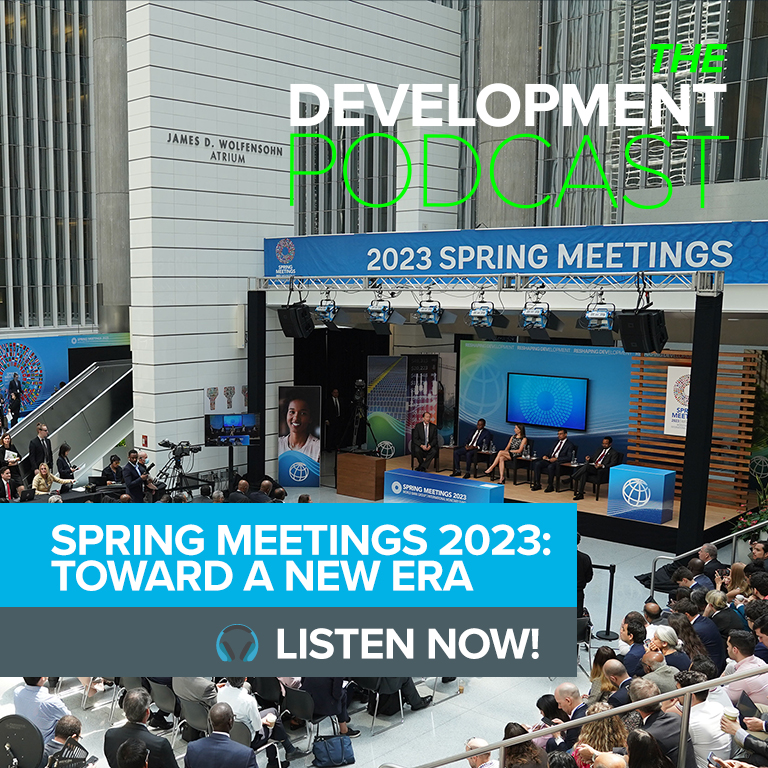
ABOUT THE DEVELOPMENT PODCAST
This international development podcast brings together the data, research—and solutions—that can pave the way to a sustainable future. Through conversations focused on revealing the latest data, the best research, and cutting-edge solutions, let us introduce you to the folks working to make the world a better place. Don't miss an episode! Listen and subscribe for free on your favorite platform. And rate our show! ;)
Tell us what you think of our podcast here >>>. We would love to hear from you!
ABOUT THE WORLD BANK GROUP
The World Bank Group is one of the world’s largest sources of funding and knowledge for low-income countries. Its five institutions share a commitment to reducing poverty, increasing shared prosperity, and promoting sustainable development.


